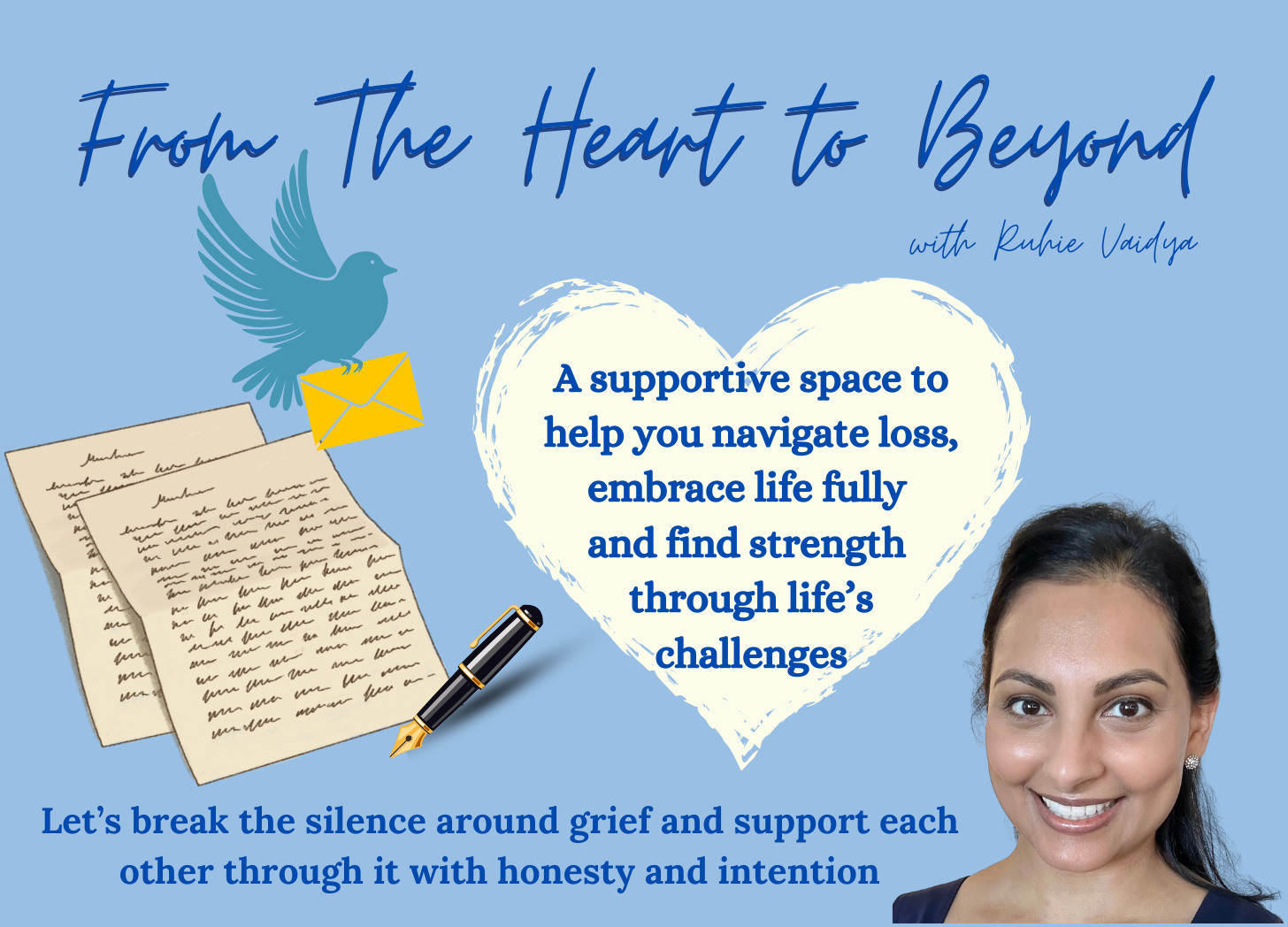
In today’s newsletter, I tackle the “shoulds” that often hold us back in grief — and explore how to let go of them with more self-compassion and a new perspective.
I’d love to hear from you! When you’re done reading, click the comment button below and share with us:
Which “should” has been the hardest for you to let go of in your grief journey? What do you think makes it so challenging, and what’s one step you could take to begin shifting that belief?
Before we get to today’s newsletter, a quick intro:
Hi, I’m Ruhie! A writer, doctor & grief advocate. I’m also a millennial mum of three, second-generation Indian-Australian, recovering perfectionist, and caffeine addict.
Welcome to: **
** Soon to undergo an exciting rebrand! Stay tuned for more on this NEXT WEEK! **
Dear Dad,
A side of grief no one warns you about is guilt and self-blame.
When you died, I expected sadness and sorrow. You know there will be pain and despair. The tears and anger didn’t surprise me. Neither did shock and denial, loneliness and emptiness, and even a hint of relief that you weren’t suffering anymore.
What I didn’t expect to hit me so hard was the crushing guilt and self-blame that came hand in hand with grief. As if losing someone you love isn’t hard enough, you get trapped in this vicious cycle of “what ifs” and “should haves” — expectations we place either on ourselves or by societal pressures.
I’ve worked hard to let go of the “shoulds” that hold me back in grief. To be honest, even six years later, it’s still a work in progress. But by challenging these “shoulds” to be more truthful and kinder to ourselves, we can gradually release their grip, allowing ourselves to move forward with the grace and compassion we deserve.
1️⃣ “I should have seen the signs”
This was a big one for me, and for many others. We often convince ourselves that if we had just paid closer attention or taken their health and safety more seriously, we could have changed the outcome and they might still be here. Personally, as a doctor trained to help people, the thought that I might have missed something that could have saved you was unbearable. But over time, I’ve come to recognise the core issue with this “should” — the illusion that we’re in control or have the power to intervene, when in many situations, we simply don’t.
REFRAME!
Maybe there were no signs. Or maybe they’re only visible now in hindsight. Would seeing them have made a difference anyway? You may never know. But beating yourself up about it isn’t helpful — and certainly isn’t deserved.
The truth is, some things in life are beyond our control, and death is one of them.
Release yourself from those unrealistic expectations. Let go of guilt and self-blame.
2️⃣ “I should have been there when they died”
Regret over not being there when a loved one passes is all too common. We replay our last interaction with them, wondering if staying longer, calling sooner, or being present might have changed things. I still wrestle with the fact that you asked for me the night you died, but I wasn’t there. Even if the outcome wouldn’t have changed, it’s natural to wonder if our presence might have provided them comfort and love in their final moments.
When I’ve shared this feeling with others, they’ve been quick to reassure me: “But you didn’t know!” I’ve slowly come to appreciate they’re right. I had no way of knowing when I left the house that evening that it would be the last time I’d see you alive.
Rehashing the past and wondering “what if” doesn’t change what happened. Beating ourselves up for not being there serves no one and only deepens our pain.
REFRAME!
It’s common to feel guilty if you weren’t there when someone you love passed, but please remember: It’s not your fault. There is no way to predict when someone’s time will come.
It. Is. Not. Your. Fault.
You did the best you could with the knowledge and circumstances you had at the time. Allow yourself to move forward without the burden of self-blame. You can’t change the past, but you can find peace in knowing your heart was in the right place.

3️⃣ “I should be grateful for the time I had with them”
How often have you been told to “focus on the positives” or “be grateful for the time you had”? It's a common sentiment, but it oversimplifies the complex emotions we experience in grief. Gratitude doesn’t erase pain, nor does pain negate gratitude. We can hold both feelings at the same time.
REFRAME!
You can be both grateful for the time you had with them AND devastated that it was cut short. There is never enough time with those we love and it’s entirely natural to grieve that loss. It doesn’t mean you aren’t thankful for the time you shared with them. And gratitude doesn’t make their loss any less painful. In fact, it’s just another reflection of how much they meant to you.
4️⃣ “I should be over it by now”
There’s an unrealistic expectation in society that, after a certain amount of time, we should “get over” grief. We’re often told that, eventually, we’ll reach the ‘other side’ and our grief will disappear. But weeks, months, or even years later, we’re expected to move on as if the loss never happened, as if their absence hasn’t left a hole that can never be filled.
Even writing this down feels absurd. Of course, there is no “moving on” from grief! Yes, we pick up the pieces and keep moving forward, experiencing new things and re-discovering joy, hope, and love. But they’re still gone, and we still miss them. At every milestone, every special occasion, every time we hear their name or eat their favourite foods or sing their favourite songs — the grief is still there, quietly reminding us of what’s missing.
REFRAME!
You lost someone who meant so much to you. That’s not something you just “get over” — nor should you. Grief is a reflection of the deep love you had for them. It’s how we carry that love with us, even when they’re no longer here.

5️⃣ “I should have been better to them when they were alive”
This is one of the most common and hardest “shoulds” to shift in grief. So often we look back on all our time with them — a lifetime of memories, both good and bad — and yet somehow we focus only on our flaws. The moments when we weren’t our best. After you died, I kept thinking about all the times I lost my patience with you, or when I’d get frustrated with the ridiculous nicknames you gave me. There are so many times I wish I could go back in time and do things differently. But dwelling on our mistakes or shortcomings keeps us trapped in regret, and prevents us from offering ourselves the self-compassion we deserve.
REFRAME!
It’s easy to judge ourselves harshly with hindsight. We tend to overlook all the positive things we did and focus only on the negatives.
You did the best you could in the circumstances you were facing and with the resources you had at the time.
You loved them as best as you could, and that is enough. You were and are enough. And deep down, they knew you loved them.
Try to remember the good things you did, the good times you shared, and all the love you gave. Be kinder to yourself.
6️⃣ “I should not talk about them because it makes people uncomfortable”
Have you ever been in a conversation where everything is going smoothly, until someone casually mentions a loved one they’ve lost, and suddenly, the room goes silent? The conversation comes to an abrupt halt, followed by awkward murmurs of sympathy or, worse yet, a quick shift to something else, as if nothing significant was said. I’ve been there — I’ve been that person, many times.
Despite being something everyone will face in their lifetime, talking about grief can be deeply unsettling for many. I get it — it's heavy and confronting, and sometimes people just don’t know how to respond.
But here’s the thing: it's completely normal to want to talk about your loved one. One of the hardest parts of grief is the isolation that comes when you can’t express your emotions openly without making others uncomfortable.
REFRAME!
Talking about those we’ve loved and lost is one of the ways we process grief and keep their memory alive. Don’t allow yourself to be silenced by other people’s discomfort. Read that again, and let it sink in.
Talk to people who make you feel heard and loved. Join a support group or start a blog.
It’s okay to talk about them. They were, and always will be, important to you.
Talking about your grief not only helps you heal, but it also helps break the silence around loss, empowering others to feel seen and less alone in their own journey.
Grief is messy, complicated and painful enough without adding guilt and self-blame to the mix. I must admit, the “shoulds” still pop up from time to time — I suspect that won’t ever go away — but I try my best to release them with these reframing tools. I don’t always get it right, but I’m doing my best to be kinder to myself and as I move forward in my grief and healing journey. I know that’s what you would want for me.
Miss you every day, Dad. Love you always. Until next time 💌
Ruhie
I’d love to hear from you! Click the comment button below and please share with us:
Which “should” has been the hardest for you to let go of in your grief journey? What do you think makes it so challenging, and what’s one step you could take to begin shifting that belief?
THANK YOU for being here and supporting my work. I am truly grateful!
If you got value from this and you think others might too, please:
Click the HEART button 💟 and leave me a COMMENT 💬
SUBSCRIBE for free to “From the Heart to Beyond”
SHARE my newsletter with someone you think would appreciate it
And don’t forget to
🌈 Live Fully
💛 Love Deeply
😁 Laugh Often
⏳ Make the most of the time we are given









Ruthie, Despite the fact that I am unable to reframe #1, I manage to block it from taking up headspace 98% of the time. When it does show up, I visualize holding up a red octagonal 🛑 stop sign and tell my self, I did nothing wrong.
Such a helpful and also compassionate view how we grieve. #2 has been the hardest “should” for me.